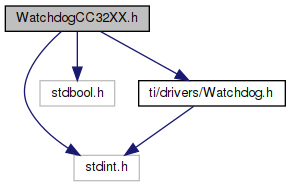

 |
 |
Watchdog timer driver implementation for CC32XX.
The Watchdog header file for CC32XX should be included in an application as follows:
Refer to Watchdog.h for a complete description of APIs.
This Watchdog driver implementation is designed to operate on a CC32XX device. Once opened, CC32XX Watchdog will count down from the reload value specified in the WatchdogCC32XX_HWAttrs. If it times out, the Watchdog interrupt flag will be set, and a user-provided callback function will be called. If the Watchdog Timer is allowed to time out again while the interrupt flag is still pending, a reset signal will be generated. To prevent a reset, Watchdog_clear() must be called to clear the interrupt flag.
The reload value from which the Watchdog Timer counts down may be changed during runtime using Watchdog_setReload().
Watchdog_close() is not supported by this driver implementation.
By default the Watchdog driver has resets turned on. This feature cannot be disabled.
To have a user-defined function run at the warning interrupt, first define a void-type function that takes a Watchdog_Handle cast to a UArg as an argument. The callback and code to start the Watchdog timer are shown below.
The watchdog timer driver does not set any power constraints. If the power driver is enabled, the application will continue to aggressively attempt to place the device into the lowest power state possible.
When the device enters Low Power Deep Sleep, the peripheral registers are reset. After a transition from Low Power Deep Sleep, the watchdog timer will be re-initialized automatically with the most recently set reload value. If Watchdog_setReload() was never called, the WatchdogCC32XX_HWAttrs.reloadValue is used. With each transition to and from Low Power Deep Sleep, the watchdog timer is implicitly cleared.

Go to the source code of this file.
Data Structures | |
| struct | WatchdogCC32XX_HWAttrs |
| Watchdog hardware attributes for CC32XX. More... | |
| struct | WatchdogCC32XX_Object |
| Watchdog Object for CC32XX. More... | |
Macros | |
| #define | WatchdogCC32XX_CMD_IS_TIMER_ENABLE (Watchdog_CMD_RESERVED + 0) |
| Command used by Watchdog_control to determines whether the watchdog timer is enabled. More... | |
| #define | WatchdogCC32XX_CMD_GET_TIMER_VALUE (Watchdog_CMD_RESERVED + 1) |
| Command used by Watchdog_control to gets the current watchdog timer value. More... | |
| #define | WatchdogCC32XX_CMD_IS_TIMER_LOCKED (Watchdog_CMD_RESERVED + 2) |
| Command used by Watchdog_control to determines whether the watchdog timer is locked. More... | |
| #define | WatchdogCC32XX_CMD_GET_TIMER_RELOAD_VALUE (Watchdog_CMD_RESERVED + 3) |
| Command used by Watchdog_control to gets the current watchdog timer reload value. More... | |
Variables | |
| const Watchdog_FxnTable | WatchdogCC32XX_fxnTable |
| Watchdog function table for CC32XX. More... | |
| const Watchdog_FxnTable WatchdogCC32XX_fxnTable |
Watchdog function table for CC32XX.